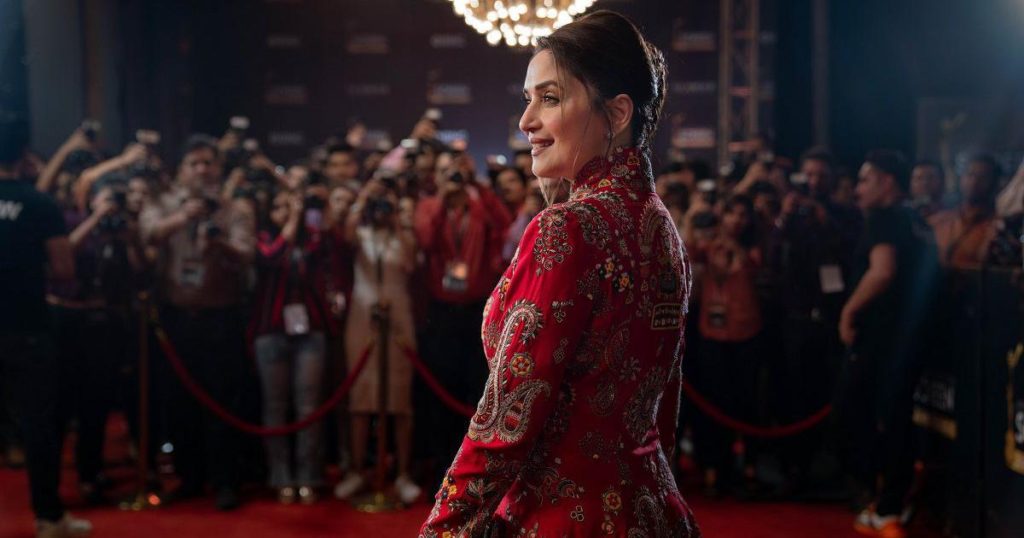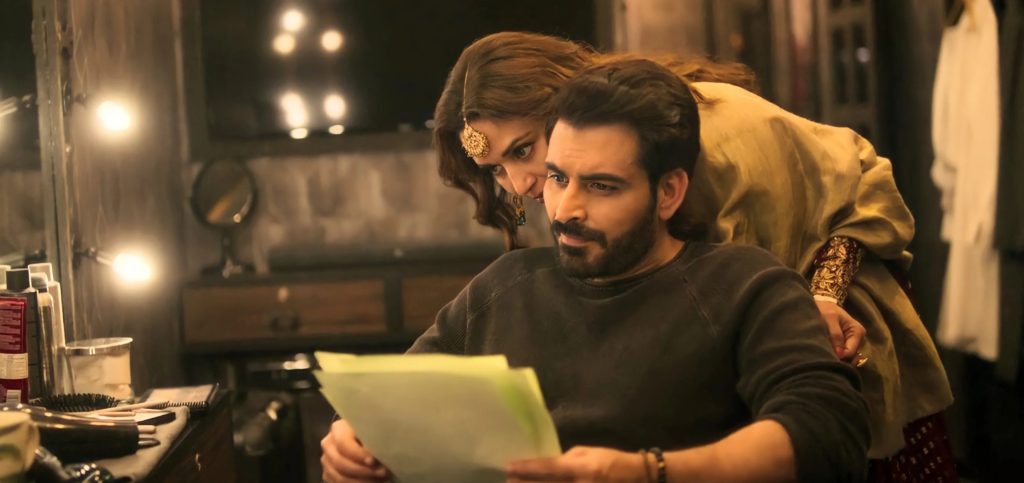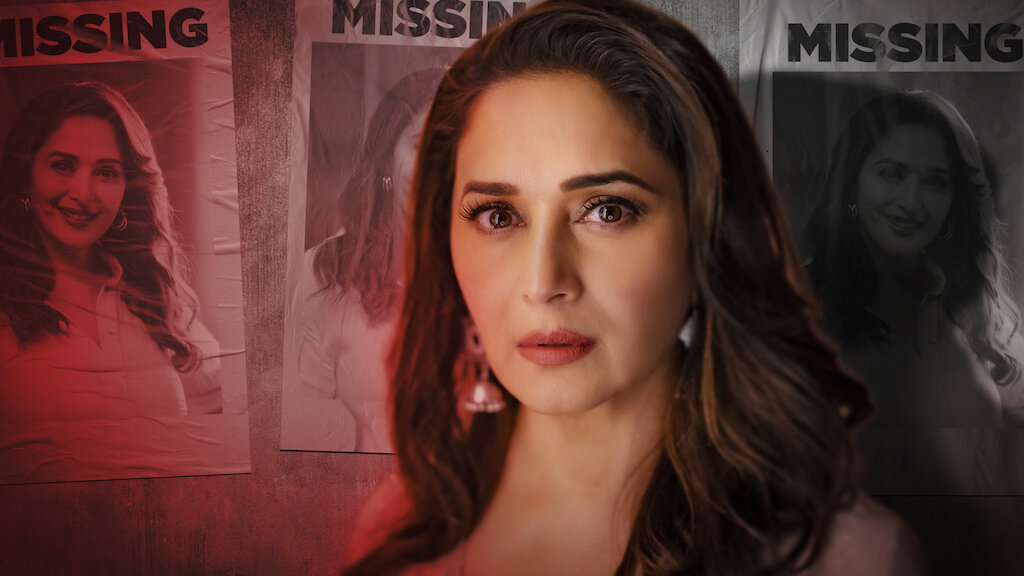The Fame Game is best characterized as a family drama, and is least effective as a crime series. It includes very little investigative police work, but so much of trite dramatization of overdone tropes.
For a Bollywood-obsessed nation, creator Sri Rao’s eight-part limited series on Netflix plays all its cards to appeal on the right notes- not only do we see a 90s superstar- one of the biggest and most loved stars of all time, might I add- play an aging actress clinging on to her fame, fans and fortune, but also Madhuri Dixit’s actual songs and movie clips pop up sporadically as those of Anamika Anand’s. Anamika dances in the streets with her fans to ‘Channe ke khet mein’, scenes from Kalank play on TV sets, fans refer to her 1000-watt smile.
The show opens with Anamika Anand going missing, leaving a confused family behind to deal with the media frenzy. We see the show through Rajshri Deshpande’s perspective. The actor plays a lesbian police character and it is refreshing to see that not defining her personality. The show treats it as just a part of her existence and as normal as yours and mine. When the police, led by Deshpande, begin investigating her disappearance, skeletons pop out from every closet of the celebrity’s picture-perfect family. Intercutting the present day with the six months leading up to the incident, the story unveils layers of darkness under the truth of Anamika’s seemingly perfect life, delving into the complexity of her relationship with her teenaged children, her ambitious and pushy mother (Suhasini Mulay), her emasculated husband Nikhil (Sanjay Kapoor) and co-star Manisha Khanna (Manav Kaul).

It is all about the open secrets of Bollywood that the makers play with. We get to know nothing new about the dark side of celebrities. All plot points are tropes we already associate with celebrity life: affairs, stalkers, financial issues, domestic problems, troubled childhood, etc. However, The Fame Game does acknowledge the problems with the industry: name changes, pay disparity, age gap, gender inequality, and casting couch, among others. We are all aware of the stories about young girls being pushed to work and support their families from an early age, with mothers becoming managers, or at least the puppeteers. We know about obsessive fans – represented here by a boy called Madhav (Gagan Arora). Anamika’s life is about these tropes, and also about lost love, and lack of agency. Her angst reverberates in the line, “All these roles… daughter, wife, mother, actress. I am tired. I want to live life on my own terms.”
The Fame Game’s Anamika Khanna comes out so raw as a wounded star that I often mistook her as Madhuri Dixit herself. Her flawless acting seemed to converge screen and realities altogether.
Sri Rao blurs the line between reel and real and goes meta in the sketching. He doesn’t create fictional content to define Anamika’s filmography. Dixit does it all. She sings, dances, lights up the screen- sometimes with Bhaivabhi’s choreography or her luscious smile.
The Fame Game enthusiastically deconstructs Madhuri’s glamorous silver screen persona to build a web of deceit and intrigue. Like the layers of makeup that hide the lines and blemishes on the actor’s face, we see its use in concealing scars and family secrets too. A middle-class Marathi mulgi, who has risen all the way to the top in the harder way, is fully conscious of what it means to be a middle-aged superstar surviving in an ageist and sexist industry that is selectively unkind and capitalist.
The soul of this series lies not in Anamika’s star behavior, external interactions, talent or façade but when it explores Anamika’s interaction with her children Avi (Lakshvir Saran) and Amara (Muskkaan Jaferi). Anamika is conscious of the insecurities her children live under because of the spotlight on them especially in the era of social media and #nepokids. She also realises the partner she has may not be the partner she needs or even wants, but fame comes with a price and keeping up appearances. Sanjay Kapoor, reuniting with Dixit after 25 years, plays Anamika’s shady movie producer husband Nikhil. Nikhil gambles with Anamika’s finances, often keeping his wife in the dark. Meanwhile Anamika’s mother is an absolute shark, who had control on Anamika’s life and career from an early age, and clearly remains the boss of the house. Together, the mother-husband duo is enough to drive Anamika crazy.
The series tries to touch upon myriad of ‘trending issues’ from mental health, to body shaming, nepotism and the complexity of being a star kid to sexual orientation- offering them with a side of rich jewel tones, grey characters, gorgeous homes and some strong performances. In the flashbacks, we get to know and see a woman evolve from strength to strength. But we are made aware she is oppressed too. Even with all the seeming influence at her disposal, she is exploited by her close ones for their own benefit. There is a beautiful cinematography where we see a young Anamika and the present-day star running from something. The two worlds collide and the convergence looks three-dimensional at that point.
The music by OAFF is beautiful and intriguing. The title theme and Durr are two fascinating musical works.

Manav Kaul reminds us of Shah Rukh Khan’s personality- a charming superstar in his late age. He lives life King size and has a Mannat resembling mansion. Together Anamika and Manish are the most sought after couple in Bollywood. But he is also someone Anamika was once romantically close with. Manish reenters Anamika’s life months before she goes missing and becomes a prime suspect. Kaul really makes Manish a highly watchable, well-rounded character. Makrand Deshpande shows up as a painter who paints posters of movies on the walls of cinema halls. This is a direct reference to the renowned artist MF Hussain who did the same in his early years, and everyone knows how highly obsessed he was with Madhuri.
Lakshvir Saran is the subtle note on the show but gives a very good performance. His speech about looking for his mother and calling out his father on abusing her really lands. His tender romance with his partner is everything gentle and kind about the show I can’t wait to see more of in season 2. Suhasini Mulay brings her experience to the table and you can see it. Muskkaan Jaferi is a slow burn who goes from sweet to sinister in the final moments of the show. However personally speaking the climax doesn’t sit right. After investing 7 hours in a show, a montage playing on screen as the season finale doesn’t feel like a satisfying endgame nor are they fully able to justify or have the audience stomach what the daughter impulsively does.
Overall, the trauma inflicted on children by their parents’ actions plays a big role in The Fame Game.
Much of the story hinges on young Anamika’s relationship with her domineering mother, which eventually strings at her relationship with her daughter. Tugging at the sensitivity of generational trauma and childhood scars, it is in the final moments of the show where the rawness of Anamika’s otherwise amiable character comes out as she bares her fangs out, now in direct collusion against her daughter. As we watch Anamika break out of captivity for her survival despite it all, we see why Dixit is the absolute superstar she is.







